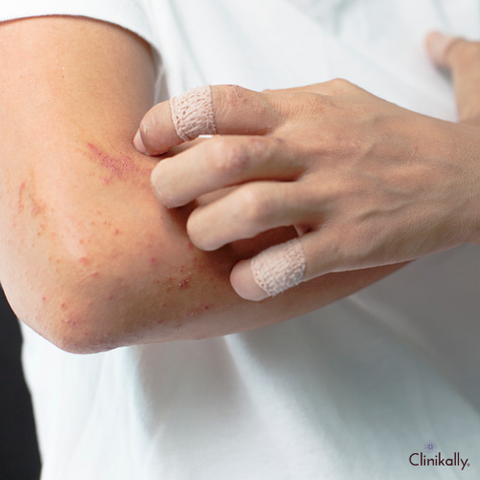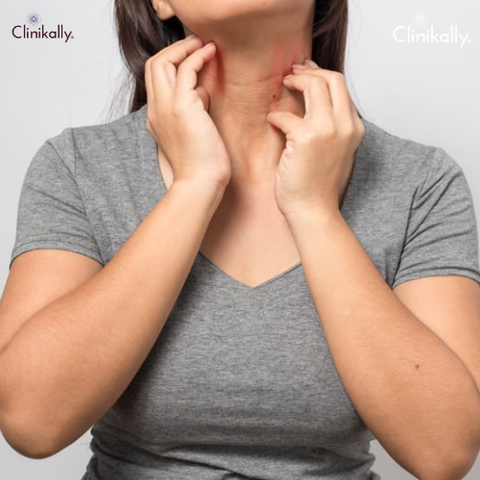Anxiety medication is often prescribed to help alleviate symptoms of anxiety, including persistent worry, fear, and panic attacks. While these medications can be a crucial tool in managing anxiety and improving overall well-being, they can also have a range of side effects that may impact various areas of the body, including the skin.
Some common skin problems associated with anxiety medication include dryness, rashes, acne, and changes in skin pigmentation. These side effects can be frustrating and may impact your self-esteem, leading to a negative impact on your mental health. However, it's essential to remember that not everyone will experience these side effects, and some may only experience them temporarily.
Fortunately, there are steps you can take to manage skin problems caused by anxiety medication. Some of these strategies include maintaining a consistent skincare routine, avoiding harsh skincare products, staying hydrated, and talking to your healthcare provider about potential alternative medications or dosage adjustments.
In this blog post, we will explore in detail the impact of anxiety medication on your skin, the common skin problems caused by these medications, and practical tips and strategies for managing skin problems while taking anxiety medication. By being proactive and taking steps to maintain healthy skin, you can help ensure that your anxiety medication is positively impacting your overall well-being without causing unwanted side effects.
How Anxiety Medication Can Affect Your Skin

Anxiety is a common mental health condition that affects millions of people worldwide. While there are several effective treatments available to manage anxiety, medication is often the first line of defense for many patients. However, while anxiety medication can help ease symptoms, it can also have unexpected side effects. One such side effect is changes in the skin, which can be both frustrating and alarming for those taking medication. In this article, we will explore how anxiety medication can affect your skin and what steps you can take to manage these side effects.
Understanding the Link Between Anxiety and Skin Health
Anxiety and skin health are closely connected. When you're anxious, your body produces stress hormones such as cortisol, which can lead to inflammation and other skin issues. Additionally, anxiety can cause physical symptoms like sweating, which can aggravate existing skin conditions. Anxiety medication aims to address these symptoms, but they can also have an impact on your skin, both positively and negatively.
Common Skin Problems Caused by Anxiety Medication
-
Anxiety medication and dry skin: Dry skin is a common side effect of many anxiety medications, including benzodiazepines and selective serotonin reuptake inhibitors (SSRIs). These medications can cause a decrease in the skin's natural oils, leading to dryness, flaking, and irritation. To combat dry skin, it's important to use a gentle, fragrance-free moisturizer and avoid harsh soaps or cleansers that can strip the skin's natural oils.
-
Anxiety medication and oily skin: Some anxiety medications, including SSRIs and beta-blockers, can cause an increase in oil production, leading to an oily complexion and potential acne breakouts. To manage oily skin, it's important to use non-comedogenic skincare products and avoid over-washing or scrubbing the skin, which can actually increase oil production.
-
Acne and anxiety medication: Some anxiety medications, particularly those that affect hormone levels, can cause or worsen acne breakouts. This is especially common with corticosteroids and some antidepressants. To manage acne breakouts, it's important to maintain a consistent skincare routine and consider using acne-fighting ingredients like salicylic acid or benzoyl peroxide.
-
Rashes and anxiety medication: Skin rashes can be a side effect of some anxiety medications, often as a result of an allergic reaction or sensitivity. These rashes can vary in severity and may include hives, itching, or redness. If you experience a skin rash while taking anxiety medication, it's important to contact your healthcare provider right away.
-
Itching and anxiety medication: Itching is a common side effect of many medications, including some anxiety medications. Itching can be caused by dry skin or an allergic reaction, and can be managed with moisturizing or antihistamine medications.
-
Psoriasis, eczema, rosacea, and anxiety medication: Psoriasis, eczema, and rosacea are chronic skin conditions that can be worsened by stress and anxiety. Some anxiety medications can exacerbate these conditions, leading to flare-ups or worsening symptoms. If you have a pre-existing skin condition, it's important to discuss potential medication side effects with your healthcare provider.
-
Sun sensitivity and anxiety medication: Some anxiety medications, including tricyclic antidepressants and benzodiazepines, can increase your skin's sensitivity to the sun. This can lead to sunburn, sun damage, and an increased risk of skin cancer. To manage sun sensitivity, it's important to wear protective clothing, use a broad-spectrum sunscreen with an SPF of 30 or higher, and avoid prolonged sun exposure.
Managing Skin Problems Caused by Anxiety Medication

Anxiety medication can provide much-needed relief for those struggling with anxiety, but unfortunately, it can also cause a range of side effects. One common side effect is changes in the skin, such as dryness, rashes, or acne. These skin problems can be frustrating, uncomfortable, and even embarrassing for those affected, leading to a decrease in self-confidence and overall quality of life. However, there are steps you can take to manage these side effects and maintain healthy, clear skin while taking anxiety medication. In this article, we will explore some tips and strategies for managing skin problems caused by anxiety medication, so you can feel confident and comfortable in your own skin.
Tips for Caring for Your Skin While Taking Anxiety Medication
-
Keep your skin clean: One of the most important things you can do to care for your skin while taking anxiety medication is to keep it clean. Dirt, oil, and bacteria can build up on your skin, leading to clogged pores, breakouts, and other skin issues. Use a gentle cleanser twice daily to remove impurities without stripping your skin's natural oils. Avoid harsh or abrasive scrubs, as these can irritate your skin.
-
Moisturize: Anxiety medication can cause dryness and irritation, making it essential to use a moisturizer to maintain healthy skin. Choose a gentle, fragrance-free moisturizer that is appropriate for your skin type, and apply it daily after cleansing. Moisturizing can also help support your skin's natural barrier function, which can be compromised by anxiety medication.
-
Wear sunscreen: Sun exposure can worsen skin problems caused by anxiety medication and lead to further damage. Make sure to protect your skin by wearing a broad-spectrum sunscreen with an SPF of 30 or higher. Reapply sunscreen every two hours, or more often if you're sweating or swimming.
-
Monitor your skin: Pay attention to any changes in your skin, such as new breakouts, rashes, or itching. These could be signs of an adverse reaction to your medication or an underlying skin condition. If you notice any concerning changes, contact your healthcare provider right away.
-
Be gentle with your skin: It's crucial to be gentle with your skin while taking anxiety medication, as harsh products or excessive scrubbing can worsen skin problems. Use gentle, non-irritating products and avoid picking at your skin or popping pimples, as this can lead to scarring and infection.
-
Maintain a healthy lifestyle: Taking care of your overall health can also benefit your skin. Eating a balanced diet with plenty of fruits, vegetables, and healthy fats can provide your skin with essential nutrients. Exercise can improve circulation and reduce stress, which can also benefit your skin. Finally, managing stress through techniques such as meditation, yoga, or deep breathing can help prevent and reduce skin problems caused by anxiety medication.
Minimizing the Impact of Anxiety Medication on Your Skin
-
Discuss your concerns with your healthcare provider: They may be able to adjust your medication or recommend alternative treatments that have fewer side effects on your skin.
-
Consider natural remedies: Some natural remedies, such as tea tree oil, can help alleviate skin problems caused by anxiety medication. Consult with a healthcare professional before trying any new treatments.
-
Stay hydrated: Drink plenty of water to help maintain your skin's hydration levels and support overall skin health.
When to Seek Help for Skin Problems Caused by Anxiety Medication
If you're experiencing persistent or severe skin problems while taking anxiety medication, it's important to consult with your healthcare provider. They can help determine if your symptoms are related to your medication and offer potential solutions. In some cases, they may recommend a different medication or dosage, or suggest additional treatments to address your skin concerns. It's essential to communicate openly with your healthcare provider about your symptoms and concerns to ensure you receive the best care possible.
In conclusion, while anxiety medication can be effective in managing anxiety, it's crucial to be aware of the potential impact on your skin. By understanding the link between anxiety and skin health, recognizing common skin problems caused by anxiety medication, and following the tips provided for managing these issues, you can maintain healthy skin while benefiting from the positive effects of anxiety medication. Remember to consult with your healthcare provider if you have concerns about your skin or need guidance on managing skin problems related to anxiety medication.
Additionally, it's important to prioritize self-care and maintain a healthy lifestyle while taking anxiety medication. This can include getting enough sleep, staying hydrated, eating a balanced diet, and engaging in regular exercise or stress-reducing activities such as meditation or yoga. By taking care of your overall health, you may also see improvements in your skin and overall well-being.
In summary, skin problems caused by anxiety medication are a common and often frustrating side effect. However, by being proactive, communicating with your healthcare provider, and prioritizing self-care, you can manage these issues and maintain healthy skin. Remember, if you're experiencing persistent or severe skin problems while taking anxiety medication, don't hesitate to seek help from your healthcare provider. With their guidance and support, you can find solutions to improve your skin health and overall quality of life.
































